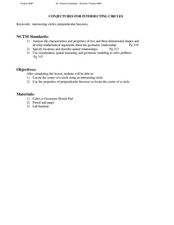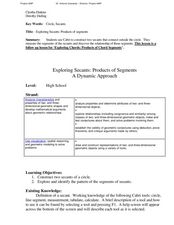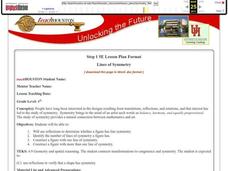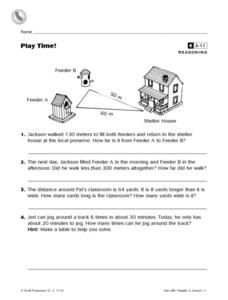Curated OER
Conjectures of Intersecting Circles
Students make conjectures of intersecting circles. In this geometry lesson, students observe circles and their position in space. They investigate and observe two and three dimensional objects.
Curated OER
Conjectures For Intersecting Circles
Pupils identify properties of circles. In this geometry lesson plan, students identify the center of two intersecting circles.They use Cabri software to create circles and move it around to make observation.
Curated OER
Exploring Chords: Products of Chord Segments
Students identify the properties of chords. In this geometry lesson plan, students multiply chord segments to find the solution to their problem. They construct two chords that cross on a circles.
Curated OER
The Multiplier (origin of the algorithm)
Students explore basic algorithms for addition, subtraction, and multiplication. They use models to demonstrate solving two-digit by two-digit multiplication. Students demonstrate vertical formats to solve multiplication problems.
Curated OER
Math in Society
Twelfth graders determine probabilities of real-life events such as life expectancies, winning a lottery ticket and the break-even premium. They apply how life-expectation tables are used to estimate the probability that an individual...
Curated OER
Boyles' Law
In this Boyles' Law worksheet, learners answer volume questions given the temperature and pressure of various gasses. In addition to computing the mathematical volume of gas, students provide answers to questions regarding the story...
Curated OER
Living in Base Ten
Students explore scientific notation and the structure of the metric system. In this middle school mathematics lesson, students read How Much is a Million? by David M. Schwartz to introduce students to the need for scientific notation. ...
Curated OER
Exploring Secants: Products of Segments
Students explore secants and circles. In this geometry lesson, students identify the properties of two and three dimensional shapes. They create arguments to prove the theorems are true.
Curated OER
Area and Measurements
Students measure the area using feet and yard. For this algebra lesson, students draw and manipulate shapes to calculate the area. They measure the relationship of area between the two units.
Curated OER
Lines of Symmetry
Fourth graders identify lines of symmetry using reflections and then construct figures that have one or more lines of symmetry. In this symmetry lesson plan, 4th graders use sets of shapes, pattern blocks, a mirror, and more.
Curated OER
Magnifiers
Students describe how several different objects magnify a provided sentence and decide if they are good magnifiers or not. They then write a sentence describing two properties an object must have in order to be a good magnifier.
Curated OER
More Pizzas and Things
Students are introduced to the problem by playing a guessing game of "I am a number, which is half of 6 and 6, what am I?" They explain their answers and see if anyone else had an alternate solution checking for reasonableness.
Curated OER
Earth Science: In Depth Look at Earthquakes
Students engage in an interactive Internet lesson plan covering the reasons and results of earthquakes. After reading eyewitness accounts and viewing animations, they use seismograms to measure and locate the epicenters. In an ongoing...
Curated OER
The Mandelbrot Set
Students explore the concept of Mandelbrot sets and Julia sets. In this Mandelbrot and Julia set instructional activity, students use a function integrator applet to investigate two-variable function iterations. Students use Julia set...
Curated OER
Time Trials
Students investigate speed, time and distance. For this algebra lesson, students utilize their knowledge of linear equations to solve problems related to time, speed and distance. This assignment is hands on using two toy race cars.
Curated OER
Extinction
Students explore reasons why the dinosaurs became extinct, and the specific needs (habitat, environment, food) of individual types of dinosaurs.
Curated OER
Cool Suits
Students examine the materials that are used to make space suits. They complete an experiment in which they test different materials in different colors to determine the best one for keeping astronauts comfortable. They analyze the data.
Curated OER
Skip it to multiply it
First graders make sensible estimates and check the reasonableness of answers.
They make up, tell and record number stories up to 9 about given objects. They skip count in twos, threes and fives.
Curated OER
Bottled Model Lungs
Students will learn about the respiratory system by comparing and contrasting models, building their own models, and giving one another feedback. Questions about familiar body systems can be useful in getting students to start thinking...
Curated OER
Choosing the Best Graph
In this mathematics worksheet, 6th graders use a line graph to illustrate how a measure of data changes and explain their reasoning. Then they use a bar graph to compare pieces of data and a pictograph to compare data.
Curated OER
Play Time!
In this reasoning worksheet, 3rd graders analyze a sketch of a house and two feeder houses in order to answer 4 mathematical word problems related to distance.
Curated OER
Loyalists
Students explain why some colonists remained loyal to England during the American revolution. In this social studies lesson, students write a letter to an editor about their reasons for remaining loyal to England.
Curated OER
The Scramble for Wealth And Power
Students participate in a simulation activity involving the distribution of the world's wealth and power. The activity starts when 100 pennies, representing wealth and power, are spread on the floor and students must grab as many...
EngageNY
Numbers in Exponential Form Raised to a Power
Develop an understanding of the properties of exponents through this series of activities. This third lesson of 15 explores the patterns associated with the power property. Scholars expand the powers before applying the property.

























